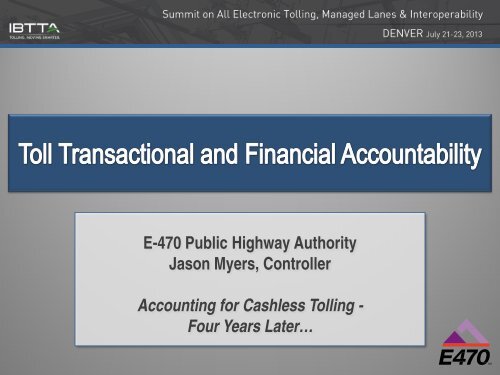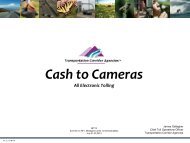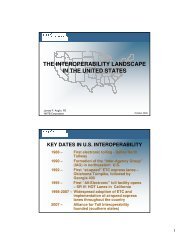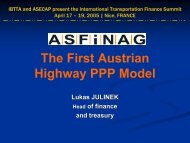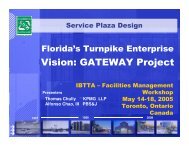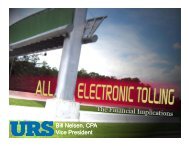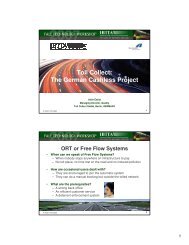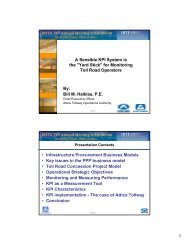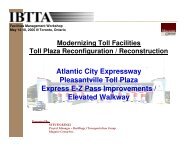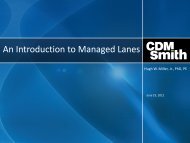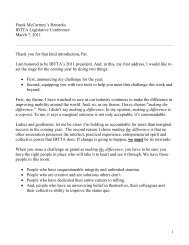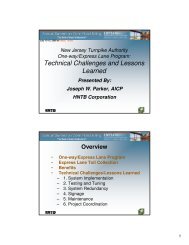E-470 Public Highway Authority Jason Myers, Controller Accounting ...
E-470 Public Highway Authority Jason Myers, Controller Accounting ...
E-470 Public Highway Authority Jason Myers, Controller Accounting ...
Create successful ePaper yourself
Turn your PDF publications into a flip-book with our unique Google optimized e-Paper software.
E-<strong>470</strong> <strong>Public</strong> <strong>Highway</strong> <strong>Authority</strong><br />
<strong>Jason</strong> <strong>Myers</strong>, <strong>Controller</strong><br />
<strong>Accounting</strong> for Cashless Tolling -<br />
Four Years Later…
• 47 center line miles<br />
• 54,000,000 toll<br />
transactions<br />
• $117,000,000 toll<br />
revenue<br />
• $137,000,000 total<br />
revenue<br />
• $1.6 billion in<br />
outstanding debt<br />
<strong>Authority</strong> Overview
<strong>Authority</strong> History<br />
• 1991 – First five miles opened, one of the first toll<br />
roads to implement open road tolling (ExpressToll)<br />
• 2003 – Final section was opened, completing the 47<br />
mile semi-circle around Denver<br />
– 5 mainline toll plazas<br />
– 32 ramp locations<br />
• 2009 – Discontinued cash collection in the lanes,<br />
introduced License Plate Tolling (LPT)
Progression of E-<strong>470</strong> Tolling<br />
• Up to 2008 – ETC (transponder) OR cash<br />
collections at toll booths; toll increases every 3<br />
years<br />
• 2009 – Implemented photo billing (LPT)<br />
– Implemented toll accrual accounting<br />
– Developed accounting methodologies<br />
– Numerous operational changes<br />
• 2010 – changed billing process for fine amounts and<br />
payment periods
Progression of E-<strong>470</strong> Tolling<br />
• 2011 – Toll increase policy to annual, increased LPT<br />
toll differential to 25% premium<br />
• 2012 – refined billing process for fees & fines<br />
structure, extended payment periods (again)<br />
• 2013 – Implementing vehicle registration holds for<br />
non-paying LPT customers, toll revenue study on<br />
updating/increasing LPT toll differential
Toll Collection System<br />
• Internally developed & maintained by E-<strong>470</strong><br />
• ExpressToll & LPT Modules<br />
• Integration with collection firm, DMV’s,<br />
accounting system, website<br />
• Back office for other Colorado Tolling Agencies
• ExpressToll<br />
Toll Revenue Streams<br />
– ExpressToll customers are required to prepay their<br />
accounts by cash, check, or credit card<br />
– 72% of all 2012 toll transactions were ExpressToll<br />
• License Plate Toll (LPT)<br />
– Captures images of the vehicle of which the registered<br />
owner will receive a statement of use for toll collection<br />
– LPT customers pay a 25% premium over ExpressToll<br />
customers
LPT Toll Revenue Breakdown<br />
Gross Toll Revenue (all tolls incurred)<br />
– Unbillable Tolls (Rejected) – cannot bill customer<br />
Billable Toll Revenue<br />
– Uncollectible Tolls (Unpaid) – customer won’t pay<br />
Net Toll Revenue
Unbillable (Rejected) Tolls<br />
• LPT Toll Revenue that cannot be billed<br />
• Due to various reasons:<br />
– Temporary License Plate<br />
– No Visible License Plate<br />
– No DMV Record<br />
– Obstructed Plate<br />
– Blurry Image/Weather<br />
– Other
What does this all add up to?<br />
• Most business and operational changes –<br />
IMPACTS ACCOUNTING<br />
• <strong>Accounting</strong> & reporting has become increasingly<br />
complex - Toll transaction lifecycle is longer<br />
– <strong>Accounting</strong> considerations<br />
– Financial reporting<br />
– Auditing considerations
<strong>Accounting</strong> Considerations<br />
• Accrual <strong>Accounting</strong> in accordance with<br />
accounting standards (GASB) – revenue<br />
recognition & receivables<br />
• Develop collection rate methodology<br />
• Calculate and monitor collection rates
<strong>Accounting</strong> Considerations<br />
• Tolls Receivables and Fees/Fines Receivables<br />
• Develop Write-Off Methodology *<br />
• Develop Allowance for Doubtful Accounts<br />
Methodology (Uncollectible Tolls/Fees) *<br />
* Consistent & Reasonable
General Ledger <strong>Accounting</strong><br />
• Toll System ledgers versus Toll System Reports<br />
• Daily/Monthly reconciliations<br />
• Implement proper business rules and internal<br />
controls
Financial Reporting<br />
Clear, concise, and consistent<br />
• Know your audience<br />
• Internal & external reports<br />
• Recurring analysis<br />
• Website (Investor Relations)<br />
• Annual Investor Report, Annual Audit Report, EMMA, etc.
Audit Considerations<br />
• Document:<br />
– Processes/key internal controls<br />
– Review/Approvals<br />
– Consider retention policies<br />
• Revenue recognition and accounting policies<br />
• Test key estimates and assumptions<br />
• Understand audit items requested and timing<br />
• Toll System audit procedures (IT general & application<br />
controls)<br />
• Specific Toll System generated reports
Summary<br />
• Cashless toll accounting and reporting is<br />
complex – impacted by entire business<br />
• Implement sound accounting practices<br />
• Recurring financial reporting to all parties<br />
• Ensure it is auditable


